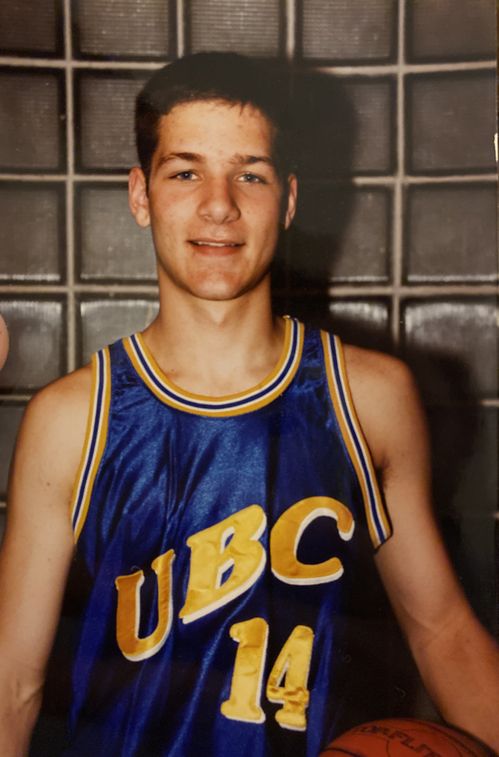Stewarding Your Talents
BEN SANSBURN

TRYOUT OR TEAM
In my teenage years, I don’t think anything that brought on more anxiety than a basketball team tryout.
I would wake up the morning of tryout with butterflies in my stomach. I’d slept fitfully, probably fighting worst-case-scenario nightmares of what the day would hold. Barely able to keep down a bowl of cereal, I would make my way over to the gym. And that’s when the real nerves would kick in.
A gym full of teenage boys, all fighting for 12 spots on a select team that might dictate their basketball future, isn’t exactly a recipe for personal, existential flourishing.
Inevitably, the first fifteen minutes of tryouts would be a mutual exercise in ‘sizing one-another up.’ As a basketball player, there’s an observational checklist you work through. Height is at the top of the list (it is basketball, of course). Shooting form, handles, jumping ability all factor in. But as much as any of those physical tools, checking out the other players’ gear matters too. Shoes, shorts, swag… all that impacts how you feel about your chances. Where you think you’ll fit in the ‘pecking order.’
It’s these questions that are the root of the anxiety: How do your talents compare with others? Where do you fit? Will you even make the cut? Do you measure up?
I would wake up the morning of tryout with butterflies in my stomach. I’d slept fitfully, probably fighting worst-case-scenario nightmares of what the day would hold. Barely able to keep down a bowl of cereal, I would make my way over to the gym. And that’s when the real nerves would kick in.
A gym full of teenage boys, all fighting for 12 spots on a select team that might dictate their basketball future, isn’t exactly a recipe for personal, existential flourishing.
Inevitably, the first fifteen minutes of tryouts would be a mutual exercise in ‘sizing one-another up.’ As a basketball player, there’s an observational checklist you work through. Height is at the top of the list (it is basketball, of course). Shooting form, handles, jumping ability all factor in. But as much as any of those physical tools, checking out the other players’ gear matters too. Shoes, shorts, swag… all that impacts how you feel about your chances. Where you think you’ll fit in the ‘pecking order.’
It’s these questions that are the root of the anxiety: How do your talents compare with others? Where do you fit? Will you even make the cut? Do you measure up?

Sadly, as much as any basketball tryout, the church can sometimes produce this kind of anxiety. We enter a new church community and we have the same questions. Where do we fit? How do our gifts compare with the gifts of others? Will we make the cut?
But church isn’t meant to be a tryout. Paul helps us see that in Romans 12. In fact, in just a few verses he gives us a portrait of Christian community that counters the ‘performance’ and ‘comparison’ culture we so easily slide into.
Consider Yourself
First, Paul exhorts us to think of ourselves through the right lens. We must be careful about thinking of ourselves “more highly than [we] ought” (Rom. 12:3), but we also must be cautious of thinking we don’t measure up or that there isn’t a place for us in the community. God has designed each of us to use our gifts to help the body function. In his first letter to the Corinthians Paul reminds us that every part of the body is “indispensable” and deserving of honor (1 Cor. 12:22). Both over-confidence and under-confidence are forms of pride we need to fight.
Instead, Paul’s prescription is that we think of ourselves “with sober judgment… according to the measure of faith that God assigned” (Rom. 12:3). In other words, we are to consider ourselves honestly before the Lord. We each have gifts, we should embrace and use those gifts with humble gratitude. That often means looking to ourselves less and to God more. It is in light of his glory that we best understand the gifts and calling he’s given us.
First, Paul exhorts us to think of ourselves through the right lens. We must be careful about thinking of ourselves “more highly than [we] ought” (Rom. 12:3), but we also must be cautious of thinking we don’t measure up or that there isn’t a place for us in the community. God has designed each of us to use our gifts to help the body function. In his first letter to the Corinthians Paul reminds us that every part of the body is “indispensable” and deserving of honor (1 Cor. 12:22). Both over-confidence and under-confidence are forms of pride we need to fight.
Instead, Paul’s prescription is that we think of ourselves “with sober judgment… according to the measure of faith that God assigned” (Rom. 12:3). In other words, we are to consider ourselves honestly before the Lord. We each have gifts, we should embrace and use those gifts with humble gratitude. That often means looking to ourselves less and to God more. It is in light of his glory that we best understand the gifts and calling he’s given us.
Consider Your Community
Second, we must see our church community through the right lens. Our brothers and sisters are not competitors, but co-laborers. God has given his church a diversity of gifts in order that together we might fulfill our mission. This is why Paul uses the analogy of the body. The church is made up of many parts operating in sync with one another.
The body needs diversity. We need “gifts that differ” (Rom. 12:6).
Second, we must see our church community through the right lens. Our brothers and sisters are not competitors, but co-laborers. God has given his church a diversity of gifts in order that together we might fulfill our mission. This is why Paul uses the analogy of the body. The church is made up of many parts operating in sync with one another.
The body needs diversity. We need “gifts that differ” (Rom. 12:6).
“If the whole body were an eye, where would be the sense of hearing? If the whole body were an ear, where would be the sense of smell."
-1 Corinthians 12:17
A church where members are posturing for influence, clamoring for the spotlight, or over-sensitive of their gifts being recognized will become toxic quickly. Competition kills community. But when each person embraces and uses their gifts joyfully, whether it is prophecy, or service, or teaching, or exhortation, or generosity, or leadership, or acts of mercy (Rom. 12:7-8), the body functions with health and purpose.
Love Genuinely
Paul then helps us see the key to this kind of community of healthy, humble servants. It is rooted in love.
Paul then helps us see the key to this kind of community of healthy, humble servants. It is rooted in love.
“Let love be genuine” - Romans 12:9
Without love, any human community will devolve into comparison and competition. But real love creates life. It wants the best for others and for the community.
Paul emphasizes some specific ways that love gets demonstrated. It “abhors what is evil, and holds fast to what is good.” It is marked by “brotherly affection,” and “outdoes [others] in showing honor.” This kind of loving community is the environment in which each member’s gifts can flourish. Imagine a community where we were constantly letting others know the ways their gifts have blessed us. Where we were tripping over each other to honor our brothers and sisters. It’s that kind of loving community, Paul is saying, that expresses that very heart of God.
Paul emphasizes some specific ways that love gets demonstrated. It “abhors what is evil, and holds fast to what is good.” It is marked by “brotherly affection,” and “outdoes [others] in showing honor.” This kind of loving community is the environment in which each member’s gifts can flourish. Imagine a community where we were constantly letting others know the ways their gifts have blessed us. Where we were tripping over each other to honor our brothers and sisters. It’s that kind of loving community, Paul is saying, that expresses that very heart of God.
Stewarding our own gifts can never be separated from stewarding the gifts given to us as a community. The church is a team, not a tryout. And that reality frees us to run with gladness in the unique gifts and calling God has given us.
“It is not great talents God blesses so much as great likeness to Jesus.”
- Robert Murray M’Cheyne
Questions for Reflection
For You:
- Take some time this week to consider yourself. When you think about your gifts and calling within the church, do you tend toward over-confidence or under-confidence? What would it mean for you to “think with sober judgment”?
- Understanding yourself and the way God has made you is an important part of stewarding your talents. If you’ve never used a self-discovery tool like the Myers-Briggs personality assessment, or a Spiritual Gifts inventory, consider doing that this week. We always must be careful about over-emphasizing the place of these tools. Remember, they are never a substitute to knowing yourself by being in community under God’s Word. Further, they are never to become an excuse to not grow and change through the Spirit’s power! However, self-discovery tools like this, in their right place can be helpful.
- Consider your current involvement at Summit. After looking at your stewardship of time last week, how is God calling you to re-prioritize the way you steward your time and talents for his glory?
For Others:
Gifts are discovered in the context of a humble, mutually honoring community. Consider taking two steps this week:
Gifts are discovered in the context of a humble, mutually honoring community. Consider taking two steps this week:
- Ask a close Christian friend to honestly share with you where they see your gifts. How have they seen God work through you in their life or the lives of others?
- Write a note this week to another person in our community whose gifts have blessed you. Honor them by sharing the ways you see God’s grace at work in their life and encouraging them to continue exercising the gifts God has given them.
Prayer from The Valley of Vision
O My Lord,
Forgive me for serving you in sinful ways -
By glorying in my own strength
By forcing myself to minister through necessity,
By accepting the applause of others,
Help me to see
That it is faith stirred by grace that does the deed
That faith brings a man nearer to you,
That faith centers in you as God all-sufficient,
Father, Son, Holy Spirit.
It is my duty to set you above all others in mind and eye;
But it is my sin that I place myself above you.
Keep me in a faith that works by love, and serves by grace.
Forgive me for serving you in sinful ways -
By glorying in my own strength
By forcing myself to minister through necessity,
By accepting the applause of others,
Help me to see
That it is faith stirred by grace that does the deed
That faith brings a man nearer to you,
That faith centers in you as God all-sufficient,
Father, Son, Holy Spirit.
It is my duty to set you above all others in mind and eye;
But it is my sin that I place myself above you.
Keep me in a faith that works by love, and serves by grace.

